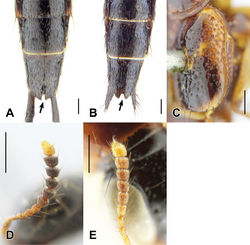Bolitogyrus mulayitensis
| Notice: | This page is derived from the original publication listed below, whose author(s) should always be credited. Further contributors may edit and improve the content of this page and, consequently, need to be credited as well (see page history). Any assessment of factual correctness requires a careful review of the original article as well as of subsequent contributions.
If you are uncertain whether your planned contribution is correct or not, we suggest that you use the associated discussion page instead of editing the page directly. This page should be cited as follows (rationale):
Citation formats to copy and paste
BibTeX: @article{Brunke2017ZooKeys, RIS/ Endnote: TY - JOUR Wikipedia/ Citizendium: <ref name="Brunke2017ZooKeys">{{Citation See also the citation download page at the journal. |
Ordo: Coleoptera
Familia: Staphylinidae
Genus: Bolitogyrus
Name
Bolitogyrus mulayitensis Brunke sp. n. – Wikispecies link – ZooBank link – Pensoft Profile
Type locality
Mt. Mulayit, Kayin State, Myanmar.
Type material
Holotype (♂, SDEI): Tenasserim, M. Mooleyit [=Mt. Mulayit], 1800–1900m, Fea, Marzo, 1887 [printed] / Cyrtothorax vulneratus Fvl. [written] / Coll. Kraatz [printed] / HOLOTYPE Bolitogyrus mulayitensis Brunke, des. A. Brunke 2017 [red label] / AJB0000424 [identifier label].
Paratype (1 ♀, IRSNB): same data as holotype with AJB0000425.
Diagnosis
This species may be recognized by the following: head entirely dark; pronotum widest in posterior third; elytra partly dark, discal markings of elytra extending onto epipleuron, forming v-shape (as Figs 2E, 7C); epipleuron entirely pale (Fig. 7C); antennomere 8-9 distinctly transverse (Fig. 7D); frons with distinct microsculpture.
Description
Measurements ♂ (n = 1): HW/HL 1.38; PW/PL 1.42; EW/ EL 1.22; ESut/PL 0.82; PW/HW 1.07; forebody length 4.5 mm.
Measurements ♀ (n = 1): HW/HL 1.37; PW/PL 1.36; EW/ EL 1.20; ESut/PL 0.90; PW/HW 1.03; forebody length 4.5 mm.
Similar to B. solodovnikovi and differing only in the following: pronotum with broad medial darkening; epipleuron entirely pale (Fig. 7C); abdominal tergites IV-V with medial darkening, VI entirely dark; apical antennomere distinctly paler than previous, yellow; head with distinct microsculpture on frons; pronotum distinctly (male) to slightly (female) more transverse; elytral suture relatively longer than pronotum at middle in female; abdominal tergite VI not distinctly impunctate at middle; median lobe in lateral view with apical portion triangular and ventral face slightly inflated, apex with minute tooth formed from median carina, basal teeth present and appearing removed from ventral face (Fig. 17B); median lobe in parameral view only weakly expanded at apical two-thirds, with apical portion shorter, with apex acute and rounded, basal teeth appearing at lateral margins (Fig. 17A); paramere far narrower, with long apical portion narrowed to apex, medial group of peg setae present and extended apicad to overlap with marginal group, medial setae distinctly larger than marginal setae (Fig. 17C); female tergite VIII with minute triangular emargination; female tergite X shield-shaped, with broadly rounded but projected apex, disc slightly raised and with slight longitudinal impression.
Distribution
Figure 21A. Known only from Mt. Mulayit, in southern Myanmar.
Bionomics
The type series was collected in March at a relatively high elevation (1800–1900 m).
Etymology
The species is named after Mulayit Taung, a mountain in southern Myanmar. The type series was collected near its summit.
Comments
Bolitogyrus mulayitensis is most similar to B. feai but can be distinguished by the distinctly transverse apical antennomeres and strong microsculpture on the frons.
Original Description
- Brunke, A; 2017: A revision of the Oriental species of Bolitogyrus Chevrolat (Coleoptera, Staphylinidae, Staphylininae) ZooKeys, (664): 1-97. doi
Images
|



